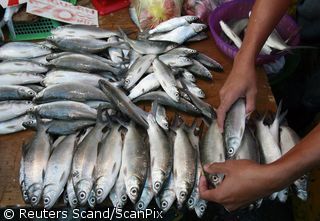The pensions question needs to be resolved between Poland and Eurostat and at some point there will be some form of agreement
Published:
19 October 2004 y., Tuesday
The pensions question needs to be resolved between Poland and Eurostat and at some point there will be some form of agreement.
MichaŠŠ DybuŠŠa, chief economist with BNP Paribas:
"The pensions question needs to be resolved between Poland and Eurostat and at some point there will be some form of agreement. The final exchange rate for the Euro will need to be found and calculations would indicate that a rate could be 4.20 zŠŠoty or even slightly less at 4.10.
"If you look at Poland and the rest of the Central European countries, they are much closer to convergence in terms of business structures than, say, Portugal, Greece and Ireland were, and that will allow them to withstand the asymmetrical shock of convergence.
"Secondly, the Euro zone offers the benefit of taking advantage of lower interest rates. In the Euro zone they have a base rate of 2 percent and in Poland interest rates are 6.5 percent. This is a tremendous difference and will be greatly appreciated by businesses. So from these points of view we can say the quicker the better in terms of joining the Euro zone.
"In terms of entry, Slovenia is particularly well placed, but if you look at the four Central and Eastern European countries-Hungary, Czech Republic, Slovakia and Poland-we are well placed because not all the other countries have such good economic track records.
"Opposition might come from old EU countries like France and Germany, which are suffering at the moment and might say taxes are too low and that Poland will offer unfair competition. This is the political dimension, and if France and Germany do not feel very secure it could prove a difficulty. One can imagine that Poland's fiscal policy and figures will not only be scrutinized in Brussels but will be examined in great detail in the likes of Paris and London. I can't talk for the political sector but the business sector is prepared to weather this and that indicates the strength of Poland in these areas.
"The only area where I can see a detrimental effect is the death of the Polish markets. That will mean there is no more work for people like me and we will have to find other work. Putting that aside, there seems to be a certain amount of optimism when you consider membership in the Euro zone."
Šaltinis:
wbj.pl
Copying, publishing, announcing any information from the News.lt portal without written permission of News.lt editorial office is prohibited.
The most popular articles
 The European Commission has today decided to close the formal investigation procedure into the agreement between Bratislava Airport in Slovakia and Ryanair after concluding that the airport operator acted as a market economy investor and therefore no advantage has been granted to Ryanair.
more »
The European Commission has today decided to close the formal investigation procedure into the agreement between Bratislava Airport in Slovakia and Ryanair after concluding that the airport operator acted as a market economy investor and therefore no advantage has been granted to Ryanair.
more »
 The coffee industry of Jamaica represents one the largest earners of foreign exchange, approximately US$30 million in 2008.
more »
The coffee industry of Jamaica represents one the largest earners of foreign exchange, approximately US$30 million in 2008.
more »
 On January 13, 2010, the Executive Board of the International Monetary Fund (IMF) concluded the Article IV consultation with Mauritius.
more »
On January 13, 2010, the Executive Board of the International Monetary Fund (IMF) concluded the Article IV consultation with Mauritius.
more »
 The World Bank's International Development Association and the International Monetary Fund have agreed to support US$1.6 billion in debt relief for the Islamic Republic of Afghanistan.
more »
The World Bank's International Development Association and the International Monetary Fund have agreed to support US$1.6 billion in debt relief for the Islamic Republic of Afghanistan.
more »
 The Common Agricultural Policy plays a critical role in helping farmers to deliver environmental goods and services, provided that policies are targeted in the right way.
more »
The Common Agricultural Policy plays a critical role in helping farmers to deliver environmental goods and services, provided that policies are targeted in the right way.
more »
 Regional Policy Commissioner Paweł Samecki will meet Croatia's Prime Minister Jadranka Kosor and members of her government in Zagreb on 25-26 January to discuss the country's preparations for accession in the context of the EU cohesion policy.
more »
Regional Policy Commissioner Paweł Samecki will meet Croatia's Prime Minister Jadranka Kosor and members of her government in Zagreb on 25-26 January to discuss the country's preparations for accession in the context of the EU cohesion policy.
more »
 The World Bank Board of Directors today approved US$20 million for the Dominican Republic in support of the Municipal Development Project, which aims to improve the technical and financial capacity of local governments.
more »
The World Bank Board of Directors today approved US$20 million for the Dominican Republic in support of the Municipal Development Project, which aims to improve the technical and financial capacity of local governments.
more »
 The European Investment Bank (EIB) is lending EUR 400 million to Ford Romania SA for the expansion and refurbishment of the company’s existing car assembly plant located in Craiova in the South-West of Romania.
more »
The European Investment Bank (EIB) is lending EUR 400 million to Ford Romania SA for the expansion and refurbishment of the company’s existing car assembly plant located in Craiova in the South-West of Romania.
more »
 The Agriculture Council of the European Union has examined ways to improve the functioning of the food supply chain with the ultimate aim of controlling the fluctuation in prices and ensuring a more equitative distribution of the added value throughout the chain.
more »
The Agriculture Council of the European Union has examined ways to improve the functioning of the food supply chain with the ultimate aim of controlling the fluctuation in prices and ensuring a more equitative distribution of the added value throughout the chain.
more »
 The European Commission has today approved an application from Lithuania for assistance under the Globalisation Adjustment Fund (EGF).
more »
The European Commission has today approved an application from Lithuania for assistance under the Globalisation Adjustment Fund (EGF).
more »